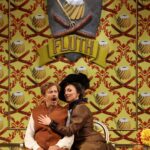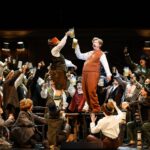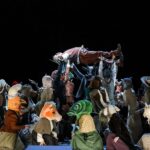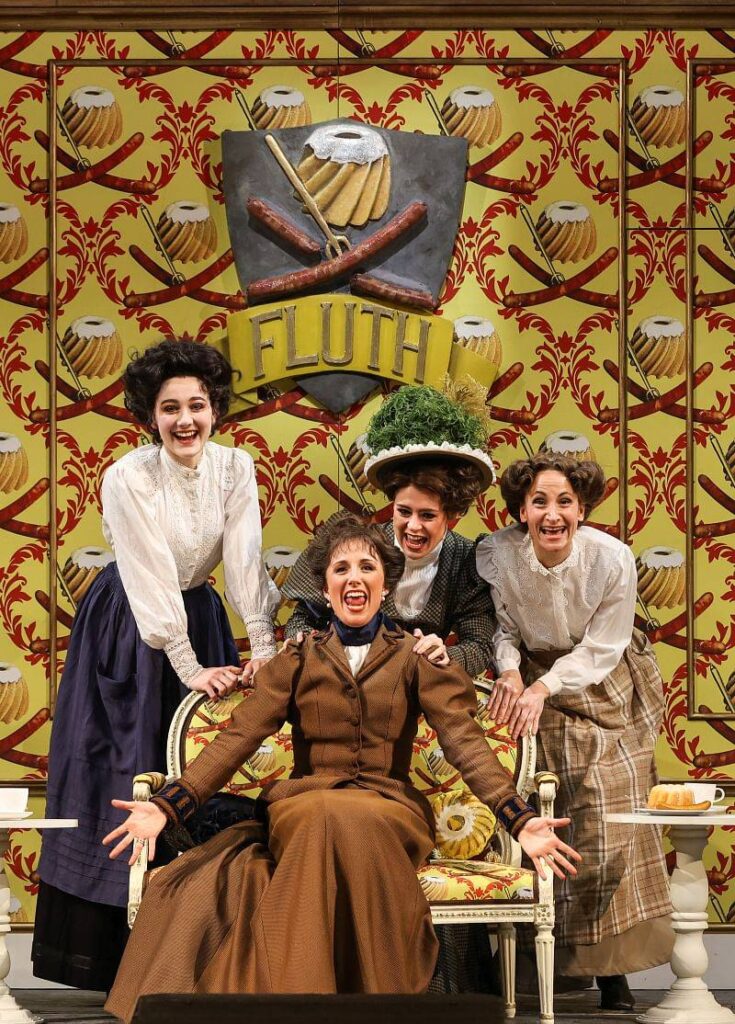Volksoper wins us over in the beauty and ingenuity of the staging, and musically reminds us why Nicolai’s opera was once so popular. From the Overture, with its familiar melodies, sumptuously played by Volksoper Orchestra under Ben Glassberg. To the astounding opening scene of late-Victorian dressed women, rolling down a sloping lawn, spelling DIE LUSTIGEN WEIBER. A wonderful introduction for a tale of budding ‘femininism’, a women’s community ‘doing it for themselves.’ They strut their stuff . And unroll a red banner!
They strut their stuff . And unroll a red banner!
Whereas the men we see, especially rival suitors Dr Cajus (Alexander Fritze), and miserly Spärlich (Carsten Suss), act like a bunch of twerps.
And the artists’ studio (with men painting female nudes) shows a sexist man’s world. In a remarkable scene, the iconic Manet painting, Olympia ‘nude reclining’, comes to life! The heads of the opera’s two heroines Frau Reich (Stephanie Maitland), and Fluth (Anett Fritsch) look out through the painting. Fluth as the reclining woman on the couch, Reich as Cupid, mischevously peering into the male domain.
They show each other identically-worded love letters. Both have ‘loving eyes’, and love champagne: it’s John Falstaff! The wives will get their revenge on him!
Meeanwhile, we see around the stage, portraits of naked women; and front-stage, surreal, half-dressed women, as if trapped in their picture frames. Women in different stage of undress. Obviously this all about gender. And the men behind their easel) are a painterly demonstration of the ‘male gaze’ (potentially voyeuers and fetishists.)
Against their exploitation, Ms Reich and Fluch plot to entice Falstaff, and then let him loose – into the river. But the laundry basket looks ridiculously small!
The age-old patriarchal bartering for a daughter- for Reich’s Anna- has the miserly Spärlich favourite. What does he want with his daughter, Reich asks of Fenton, (who’s secretly having an affair with Anna.) Fenton, is sung by Junho You’s lyrical tenor. In his beautiful aria, Fenton admits he’s ‘not rich, but he’s in love’.
Ms Fluth is seen in an amazing drawing room, its gold wallpaper with heraldic pattern, and matching chaise longue. In her aria, she rails against her seducer. Anett Fritsch is a superb soprano ( dare I say for operetta.) The woman’s heart is weak, she sings, and of her knight, Froh, Sinn und Liebe, happiness, sense and love are the spice of life. (The neglected wife, she must be frustrated!)
 At last Falstaff’s appearance. Martin Winkler’s a very deep bass for such a slight build, physically. He’s succeeded at last in approaching this Edelstein, precious stone. Winkler, in a copper-coloured suit (matching his hair colour), he’s not at all the embodiment of Falstaff we expect (from Shakespeare’s grossly over-weight, dissolute figure, on which it’s based.)
At last Falstaff’s appearance. Martin Winkler’s a very deep bass for such a slight build, physically. He’s succeeded at last in approaching this Edelstein, precious stone. Winkler, in a copper-coloured suit (matching his hair colour), he’s not at all the embodiment of Falstaff we expect (from Shakespeare’s grossly over-weight, dissolute figure, on which it’s based.)
Don’t you also love Ms Reich, Fluch asks, alluding to the circular letters. He’s beginning to seduce her on that gold couch…But of course Fluth arrives unexpectedly, intending to catch Falstaff out. The women’s collective – to save Fluths reputation, and a woman’s honour- now have Falstaff at their mercy. They appear to push Winkler’s relatively slim Falstaff into the laundry box.
Ist das nicht ein Spass…A woman can have fun and be respectable , is what these free-spirited wives are about (in Spijker’s concept.) Whereas the men’s hunting posse are archetypal slobs. Falstaff’s entourage arrive to prove Ms Fluth’s infidelity. They appear literally coming out of the woodwork, their heads popping out of the gold-papered back-wall. Fitch’s rendering of the aria Eiffersucht (jealousy) is a real gem. Falstaff, of course, hidden with the laundry to escape, is ejected into the Thames.
Falstaff recuperates from his surprise ducking, in his local. He drank till he sank. The tavern is impressively furnished – betweeen an English pub and an Austrian Gasthaus. ‘Only when the glass is empty, out come the dice!’ Winkler is raising a glass, standing on one of the tables, when a letter arrives from Fluth, apologising, sorry for the mix-up! -but tempting him to another erotic encounter. (Earlier the wives having a picnic, plotting their next scam against Falstaff.)
when a letter arrives from Fluth, apologising, sorry for the mix-up! -but tempting him to another erotic encounter. (Earlier the wives having a picnic, plotting their next scam against Falstaff.)
Interestingly, of the bawdy company, many of the bearded men are women in drag. Winkler’s Falstaff is seen, apparently pissing into the ‘fountain’ outside- doing his flies up. That’s the kind of man he is.
Now a complete change of scene, a beach, brilliantly lit, multi-coloured, portmanteau cabins/changing rooms. Why? But it looks spectacular! Who comes out in a pink, red-spotted, one-piece swimsuit, but Carsten Süss (Spärlich). Then we look down on a swimming pool. In fact, it’s a glittering turqoise covering that’s extended, stretched; uncannily resembling water. Anna (Lauren Urquart)- against this idyllic background- sings movingly of her suffering. Fenton, you don’t love me, she pleads. Terrifically sung, to a plaintive violin solo. Behind her, three swimmers dive into the pool and do head-stands. Amazing choreography. MeanWhile Anna and Fenton- to that violin solo- now profess their love. True love won’t let them down, they sing (or similar, in German.)
By contrast, jealousy, Eiffersucht– how a man can totally misinterpret (a woman’s ) behaviour. In a shocking scene, Herr Fluth (Daniel Schmutzhard, one of Volksoper’s star tenors), throttles his wife, and knocks her to the ground. He actually brings out a rubber truncheon (not a sex toy). Where is he (Falstaff), he demands, and half strangles her. Whether this scene was in Nicolai’s opera, is disputable, but it fits Spijker’s agenda. How can men be so misguided to self-justify sexist abuse.
Falstaff is dragged on, disguised ridiculously as a chambermaid. In contrast to their scheming elders, Anna and Fenton represent true love. Both appear on bikes. Oh, süsser Mond, O holde Nacht With peace enthroned, love awaits. Enchantingly sung by two highlight performances.
Act 3 opens with a lecture on women’s rights. Anna and Fenton have secretly got married. Ms Reich and Fluth talk about the state of their marriages. And Fluth won’t divorce her man. Anna persuades the wives into a new scam against Falstaff.
For the mythical ‘Chimes of Midnight’, a driving-out evil spirits, a ballet scene ensues, with antlered figures: the revenge to be meted out to Falstaff. A large white moon is suspended backstage, Nicolai’s music, is light and spritely, the dance sequence performed by Vienna State Ballet. The bikes ridden on stage symbolise women’s emancipation, and the sufragettes.
A large white moon is suspended backstage, Nicolai’s music, is light and spritely, the dance sequence performed by Vienna State Ballet. The bikes ridden on stage symbolise women’s emancipation, and the sufragettes.
In the stunning closing staging, red lanterns are suspended. A fantastical ballet is danced to music resembling Weber’s Freischutz, but here the spirits are benign. On walk Anna and her friends’s Women’s Rights banners for Wahlerecht the right to vote. Wir sind gnaden reich,richly fortunate, is the closing, affirmative chorus. It was a production rich in musical and visual highlights, with a splendid cast. © PR 19.5.2023
Photos: Lauren Urquart, ensemble; Martin Winkler (Falstaff), Anett Fritsch (Frau Fluth); Martin Winkler, Lauren Urquhart; featured image Stepanie Maitland, Anett Fritsch
All photos © Barbara Pálffy

